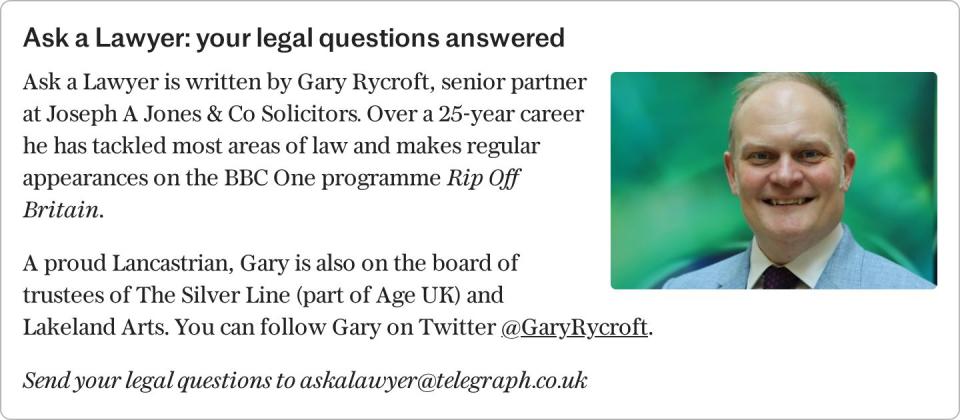‘Can I avoid inheritance tax if my son buys my house, and I pay him back?’

Dear Gary,
I understand that you cannot gift a house to someone to remove it from your estate if you continue to live in it, unless you pay a commercial rent.
I propose to sell my house, worth around £500,000 to my son who lives in Melbourne, Australia, where there is no inheritance tax.
He would take out a bridging loan to fund a legal purchase, and I would then send the proceeds back to him, and hope to live another seven years.
I realise there would be charges and currency losses, but they would not be anywhere near the £200,000 inheritance tax charges.
I would be liable for inheritance tax on the remainder of my estate, with a value of around £600,000.
Would my plan work?
Robin

Dear Robin,
I wish mitigating inheritance tax (IHT) was as simple as this. However, it is not and, in short, your plan would be a financial disaster.
The legal analysis of what you are proposing to do is gift your house to your son. Yes, I understand that you are creating a fiction that he is buying it from you, but that is not what is really going to happen, because by your own admission you intend to give the sum paid back to him.
HM Revenue and Customs will see right through this, and will consider the “sale” to be a sham for IHT purposes. The relevant provisions are the gift with a reservation of benefit (GWR) rules. On that basis, in the event of your death, the house will still form part of your estate.
Before the inheritance tax legislation was introduced in the 1980s by then-chancellor Nigel Lawson, the previous capital transfer tax regime contained no GWR rules. This lacuna in the rules meant a donor could, for example, give away a house but still live in it.
However, since March 18 1986, the GWR rules have been in force. In short, if you give an asset away, but still benefit from it, it will still be taxed as part of your estate for IHT.
The Finance Act 2004 introduced an income tax charge on benefits received by the former owners of property, referred to as the pre-owned assets tax (POAT). As you say, a way around the POAT is to pay a commercial rent for continuing to live in the house you have gifted.
I have no doubt your proposed scheme would fall foul of the legislation and would be classed as a GWR.
You have identified the cost of a bridging loan to fund the purchase and potential problematic currency exchange issues. What is worse is that if your son bought your house, he would also have to pay stamp duty for the privilege.
Non-UK residents who purchase residential property in England and Northern Ireland incur a 2pc stamp duty surcharge (the “NR Surcharge”). The NR Surcharge applies to the whole of the purchase price by adding the additional 2pc to each of the existing residential stamp duty rates. There is a lower rate if you are replacing your main residence and a higher one for other purchases.
Scotland and Wales have their own taxes that apply instead of stamp duty on acquisition of property.
An individual is considered a “non-UK resident” for stamp duty purposes if they spend fewer than 183 days in the UK in any continuous period of 365 days, beginning 364 days before and ending 365 days after the transaction occurs. Individuals are considered to have spent a day in the UK if they are in the country at midnight.
Your son living in Australia is a complete red herring so far as your own estate is concerned for IHT purposes. On your death it is your estate that will be taxed according to the British IHT regime before your estate is passed on to your beneficiaries.
Thinking ahead, if your son does inherit your estate in the UK at some point in the future, the complicated concepts of “residence” and “domicile” for IHT purposes may still mean his estate when he dies will have to pay IHT on any UK-based assets he still owns at that point. This is because HMRC will seek payment of IHT from anyone domiciled in the UK.
It is complicated, but in very broad terms, if you are born in the UK of British parents, being resident outside the UK does not always mean a person loses their UK domicile of origin. Often, to lose a domicile of origin a person must sever all ties with their original country and, for instance, no longer own assets in that country.
So even though your son is based in Australia, with you being over here, the UK regime of IHT will apply to your estate and may still apply to his. This is a simplification of the situation, but it does point to your son taking specialist legal advice when he inherits from you.
From what you say, your estate is worth circa £500,000 (house), plus £600,000 (investments), coming to £1.1m. If you are a widower, you should have your own nil-rate band (£325,000), and your late wife’s (£325,000), plus your own residence nil-rate band (£175,000) and your late wife’s (£175,000) making £1m of allowances.
So, if you are likely to live another seven years, the optimal way forward is to look at gifting at least £100,000 of your investments (if not more) to your son. If you live for seven years that will work as a valid gift, as per the legislation.
‘Ask A Lawyer’ should not be taken as formal legal advice, but rather as a starting point for readers to undertake their own further research.

